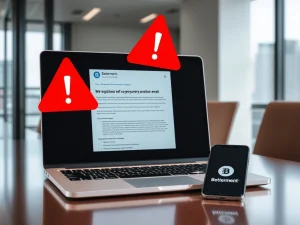Shocking Ponzi Scheme Lawsuit: Three US Banks Face Reckoning Over Alleged Fraud Facilitation

In an era where financial integrity is paramount, a significant class action lawsuit has sent ripples through the banking sector. Three prominent U.S. banks—Community Financial Services Bank, Mechanics Bank, and RABO AgriFinance—are now at the center of a legal storm, accused of complicity in a multi-million dollar Ponzi scheme. This development raises critical questions about the responsibilities of financial institutions and their role in preventing fraudulent activities. For anyone invested in understanding the landscape of financial security, this case underscores the vital need for stringent oversight and robust compliance.
Unveiling the Allegations: The Core of the **Ponzi Scheme Lawsuit**
At the heart of this unfolding legal drama is Kentucky businessman Brian McClain, who allegedly orchestrated a sophisticated Ponzi scheme that siphoned millions from unsuspecting investors. McClain, who tragically died by suicide in April 2023, is accused of promising exorbitant returns on non-existent cattle assets. The classic Ponzi structure involved using funds from new investors to pay off earlier claimants, creating an illusion of profitability that masked the underlying fraud.
The class action lawsuit specifically targets the banks, alleging they were not merely passive observers but active enablers. The plaintiffs claim these institutions:
- Facilitated fraudulent transactions.
- Ignored glaring red flags that should have triggered immediate scrutiny.
- Enabled McClain’s fictitious operation to persist for years, causing substantial financial harm to investors.
This **Ponzi scheme lawsuit** seeks to hold these financial powerhouses accountable, arguing that their alleged negligence played a pivotal role in the scheme’s longevity and scale.
When Due Diligence Fails: Red Flags and Alleged **Bank Fraud**
The lawsuit details a troubling pattern of alleged lax oversight and a failure to adhere to standard due diligence practices by the accused banks. Specific allegations against each institution paint a picture of systemic vulnerabilities:
- RABO AgriFinance: Despite concerns about McClain’s actual cattle holdings and inadequate record-keeping, RABO AgriFinance allegedly extended over $70 million in credit to him. This raises questions about the thoroughness of their risk assessment and loan approval processes.
- Community Financial Services Bank: This bank reportedly allowed McClain to maintain extended overdraft periods and, even as his financial situation deteriorated, allegedly ignored suspicious fund movements. Such actions, if proven, suggest a disregard for standard banking protocols designed to detect illicit financial flows.
- Mechanics Bank: Similar to Community Financial Services Bank, Mechanics Bank is accused of permitting McClain to maintain overdraft privileges, contributing to his ability to sustain the fraudulent operation.
The core argument of the lawsuit is that the banks’ awareness of McClain’s financial instability, coupled with their alleged failure to act on clear irregularities, demonstrates a profound lapse in their duty. This isn’t just about poor judgment; it’s about alleged complicity that facilitated widespread **bank fraud**.
The Broader Impact: **Financial Crime** and Institutional Accountability
This case has far-reaching implications beyond the immediate parties involved. It could redefine the scope of accountability for financial institutions in the context of white-collar crime. While banks often argue they cannot determine criminal intent, courts are increasingly scrutinizing their obligations to act on red flags, particularly under anti-money laundering (AML) frameworks.
If the allegations hold, the consequences for the banks could be severe, including:
- Reputational Harm: A significant blow to public trust and brand image.
- Regulatory Scrutiny: Intensified oversight from financial regulators, potentially leading to fines and stricter compliance mandates.
- Legal Precedent: The case could set a precedent for holding banks more directly liable for facilitating large-scale fraud.
This lawsuit underscores systemic risks within the financial sector. Ponzi schemes thrive on a continuous influx of new capital, and the alleged lax oversight by banks can enable such fraud to persist for years, causing immense damage. Experts emphasize the delicate balance institutions must strike between efficient operations and robust risk management, especially when dealing with opaque fund sources or inconsistent financial statements. This case serves as a stark reminder of the devastating consequences when **financial crime** goes unchecked.
Strengthening Defenses: The Crucial Role of **AML Compliance**
The allegations against these banks bring the critical importance of Anti-Money Laundering (AML) frameworks into sharp focus. AML regulations are designed to prevent illicit funds from entering the financial system and to detect suspicious activities that could indicate fraud, money laundering, or terrorist financing. The lawsuit argues that the banks’ actions, or inactions, demonstrate a failure to uphold these crucial standards.
Key areas where **AML compliance** might have been insufficient, according to the complaint, include:
- Transaction Monitoring: Failure to flag and investigate unusual or large transfers that didn’t align with McClain’s stated business activities.
- Customer Due Diligence (CDD): Insufficient vetting of McClain’s business operations and the legitimacy of his cattle investments.
- Suspicious Activity Reports (SARs): Failure to file SARs with financial intelligence units when red flags became apparent.
Regulators are likely to closely watch the outcome of this case, potentially using it to advocate for enhanced monitoring systems, more stringent penalties for non-compliance, and a broader reevaluation of how financial institutions manage risk. The case highlights that effective AML compliance isn’t just a regulatory burden; it’s a fundamental safeguard against large-scale fraud.
Protecting Your Assets: Lessons for **Investor Protection**
For individual investors, this lawsuit serves as a sobering reminder of the need for vigilance and skepticism. While banks have a responsibility to uphold due diligence, investors also play a crucial role in protecting their own assets. McClain’s scheme exploited gaps in due diligence, such as unexplained transactions and a lack of transparency—patterns seen in countless similar fraud cases.
What can investors learn from this situation to enhance their **investor protection** strategies?
- Verify Independently: Always conduct independent verification of investment opportunities, especially those promising unusually high returns. Don’t rely solely on the promoter’s claims.
- Understand the Investment: If an investment seems too complex or opaque, it often is. Demand clear explanations of how returns are generated.
- Monitor Your Statements: Regularly review financial statements and report any inconsistencies or unauthorized transactions immediately.
- Be Wary of Red Flags: Be suspicious of pressure tactics, demands for secrecy, or difficulty in withdrawing funds.
- Seek Professional Advice: Consult with independent financial advisors or legal professionals before making significant investments.
This case underscores the collective responsibility in fraud prevention. While regulators may leverage this case to advocate for enhanced monitoring systems and penalties for non-compliance, investors are also likely to demand greater transparency and accountability from the banks they trust.
Conclusion
The class action lawsuit against Community Financial Services Bank, Mechanics Bank, and RABO AgriFinance marks a pivotal moment in the ongoing battle against financial fraud. It brings to light critical questions about the extent of institutional responsibility when red flags are allegedly ignored, and Ponzi schemes are allowed to flourish. As the legal proceedings unfold, the outcome could significantly influence how financial institutions approach risk management, compliance, and their fundamental duty to protect their clients and the broader financial system from the devastating effects of fraud. This case serves as a powerful reminder that vigilance, robust regulatory frameworks, and unwavering commitment to ethical practices are indispensable in safeguarding financial integrity for everyone.
Frequently Asked Questions (FAQs)
Q1: What is a Ponzi scheme, and how did Brian McClain’s scheme operate?
A Ponzi scheme is a fraudulent investment operation where returns are paid to earlier investors using money from more recent investors, rather than from actual profits. Brian McClain’s scheme allegedly involved promising high returns on non-existent cattle investments, using funds from new investors to pay off previous ones, creating a deceptive appearance of a legitimate, profitable venture.
Q2: Which U.S. banks are involved in this class action lawsuit?
The three U.S. banks named in the class action lawsuit are Community Financial Services Bank, Mechanics Bank, and RABO AgriFinance. They are accused of facilitating the alleged Ponzi scheme by ignoring red flags and allowing fraudulent transactions.
Q3: What are the main allegations against the banks?
The lawsuit alleges that the banks facilitated fraudulent transactions, ignored red flags related to McClain’s financial activities, extended excessive credit despite concerns, and failed to address irregularities in his financial records. Plaintiffs argue these actions demonstrate a failure to uphold due diligence standards and enabled the scheme to persist.
Q4: What are the potential implications of this lawsuit for financial institutions?
If the allegations are proven, the banks could face significant financial penalties, severe reputational damage, and increased regulatory scrutiny. The case may also set a precedent for redefining accountability for financial institutions in white-collar crime, potentially leading to stricter enforcement of anti-money laundering (AML) frameworks and enhanced monitoring systems across the sector.
Q5: How can investors protect themselves from similar Ponzi schemes?
Investors can protect themselves by independently verifying investment opportunities, being skeptical of unusually high returns, understanding the details of any investment, regularly monitoring their financial statements, and seeking advice from independent financial advisors. Being aware of common red flags, such as pressure tactics or difficulty withdrawing funds, is also crucial.
Q6: What role does AML compliance play in preventing such fraud?
Anti-Money Laundering (AML) compliance frameworks are designed to detect and prevent illicit financial activities, including fraud. They require banks to conduct thorough customer due diligence, monitor transactions for suspicious patterns, and report suspicious activities. Strong AML compliance is essential for financial institutions to identify and act on red flags, thereby preventing their systems from being exploited by criminals.









